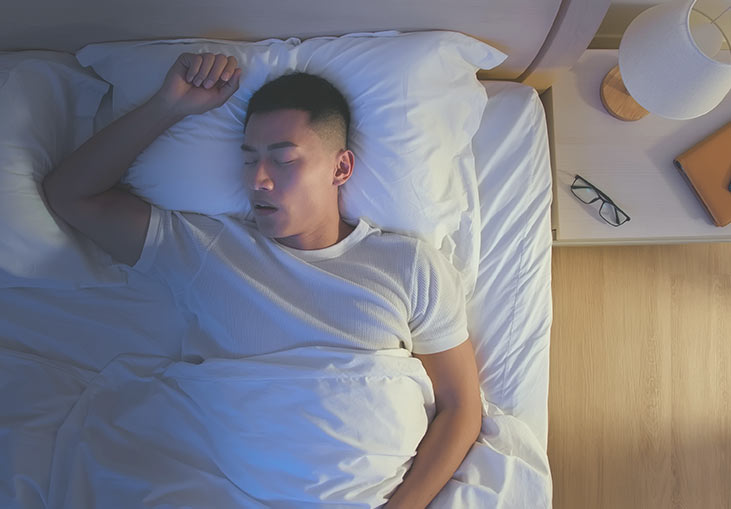This post is a section of our report, A Leader’s Guide to Well Being. For a copy of the whole report, email info@sierraleadership.com.
Getting a good night of sleep

Not getting enough sleep? You’re not alone—nearly half of executives are sleep deficient.
And the costs are dramatic. Lack of sleep causes a drop in vital leadership capabilities like problem solving, decision making, a results orientation, and an ability to process multiple perspectives. Insufficient sleep also contributes to a host of health problems: compromised immune system, weight gain, heart disease, depression, and anxiety just to name a few. Getting the sleep you need is critical for good leadership.
Working towards a good night’s sleep makes sense. To improve your sleep, start with a plan.
Creating a sleep strategy
During the day
Make the most of light. Use light to give your body natural cues to be awake and alert. Boost your serotonin, the body’s energizing and positivity hormone, by spending as much time as you can outdoors. Go for a morning walk, take meetings and calls outside. Let as much natural light into your workspace as possible. Add full-spectrum electric lights to your home and work areas.
Exercise often. Get regular exercise, which can improve sleep and reduce stress in other parts of your life. Aerobic exercise is especially helpful. Keep moving. It’s one of the best things you can do for your overall well being.
Establish a pattern to your day. Create an overall rhythm for your life—times when you exercise, work, eat, interact with family, and take breaks. Healthy routines help you feel more grounded. A chaotic schedule will leave you feeling scattered and can impact sleep.
At night
Dim the lights. In the evening, dim the lights to kickstart melatonin, the relaxation hormone. Put electronics away and turn off video screens at least an hour before bed. Keep a soft light and a paper book or journal next to your bed. If you find yourself awake, you won’t be tempted to use your phone.
Whatever you do to get there, a good night’s sleep is worth the investment—for you, and your team.
Create a sleep sanctuary. Use cozy fabrics for sheets and bedding and ensure quiet and dark as much as possible. Decorate with an eye to calm. Remove anything stressful from your bedroom—including your phone and laptop. Keep it at a consistent, cool temperature.
Design a wind down ritual. Eliminate alcohol and caffeine or other stimulants near bedtime. Have a bath or hot shower and meditate. Maintain the same sleep and wake times every day. If you can’t sleep, get out of bed and do something relaxing, then try again. Don’t force it and don’t worry about it.
Try sleep restriction. If you’re really having a hard time getting restful sleep, consider sleep restriction. Limit your time in bed to a specified period, say 12 a.m. to 6 a.m. (but not less than 5.5 hours). Then gradually increase by 15-30 minute increments every week or two, until you reach an optimal amount. This can limit unrestful time in bed and improve sleep quality.
What if I still can’t sleep?
It takes time to build a routine that works.
It takes time to build a routine that works. Tweak and reset goals as needed just like you would when embarking on a fitness or business goal. Be persistent, there’s a lot to learn about how you get your best sleep.
Finally, talk with your doctor. Treat sleeplessness like any important medical concern, and get professional help. We know people whose sleep problems got dramatically better after a doctor’s visit, a sleep study, and daily use of a continuous positive airway pressure machine.
Whatever you do to get there, a good night’s sleep is worth the investment—for you, and your team.
Our favorite tips
- Stick to the same sleep and wake times every day
- Keep your bedroom at a consistent, cool temperature. Make it a quiet, dark sleep sanctuary
- Create a wind down ritual– including a warm bath or hot shower and meditation
- Eliminate alcohol in the evening and don’t drink coffee after noon
- If you can’t sleep, get out of bed and do something soothing then try again. Don’t force it and don’t worry about it
- Get regular aerobic exercise
- Reduce stress in other parts of your life
Our best resources
- Improving Sleep: A guide to a good night’s rest (Harvard Health Publishing, Harvard Medical School)
- There’s a Proven Link Between Effective Leadership and Getting Enough (Sleep Nick van Dam and Els van der Helm, HBR)
- Sleep On It: Improving Your Bottom Line Through Better Sleep (Tatum Wheeler, Sierra Leadership Blog)